Reflective Activity Writing: ICT, Ethics, and Future Trends
VerifiedAdded on 2021/10/26
|6
|1183
|226
Essay
AI Summary
This reflective essay explores the multifaceted impact of Information and Communication Technology (ICT) on contemporary life, examining its influence on social norms, individual behaviors, and future societal structures. The essay delves into the ethical dimensions of digital citizenship, highlighting the importance of responsible online conduct and the potential consequences of unethical practices. Drawing on various sources, including academic research and real-world examples, the author analyzes the evolution of social media usage, the impact of media portrayals on societal values, and the role of digital literacy in shaping future learning environments. The essay emphasizes the need for conscious decision-making in the digital realm, advocating for positive engagement and awareness of the potential challenges of an ICT-dependent world. The author concludes by stressing the critical role of ethical digital citizenship in mitigating the negative impacts of technology and preserving human values in an increasingly digitized society.
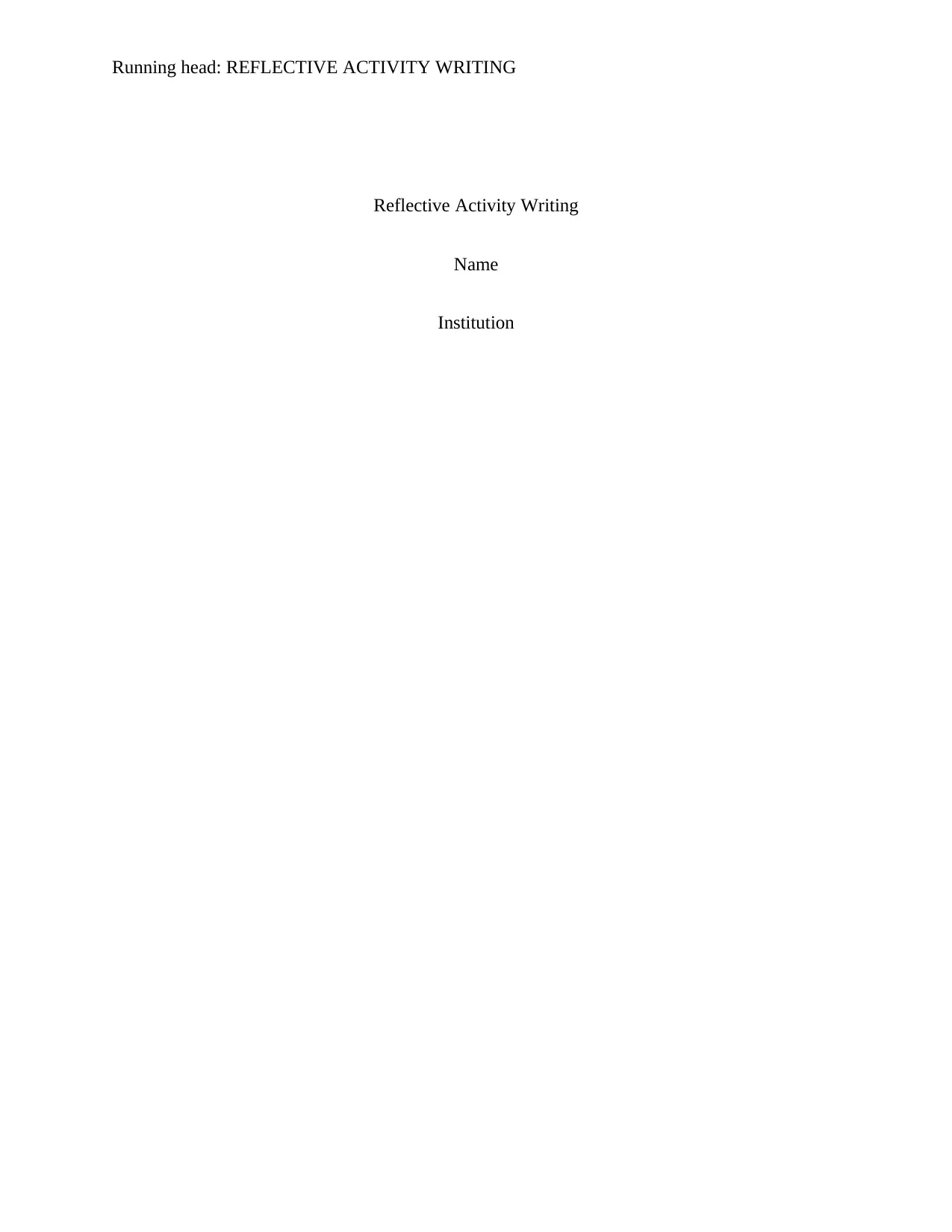
Running head: REFLECTIVE ACTIVITY WRITING
Reflective Activity Writing
Name
Institution
Reflective Activity Writing
Name
Institution
Paraphrase This Document
Need a fresh take? Get an instant paraphrase of this document with our AI Paraphraser
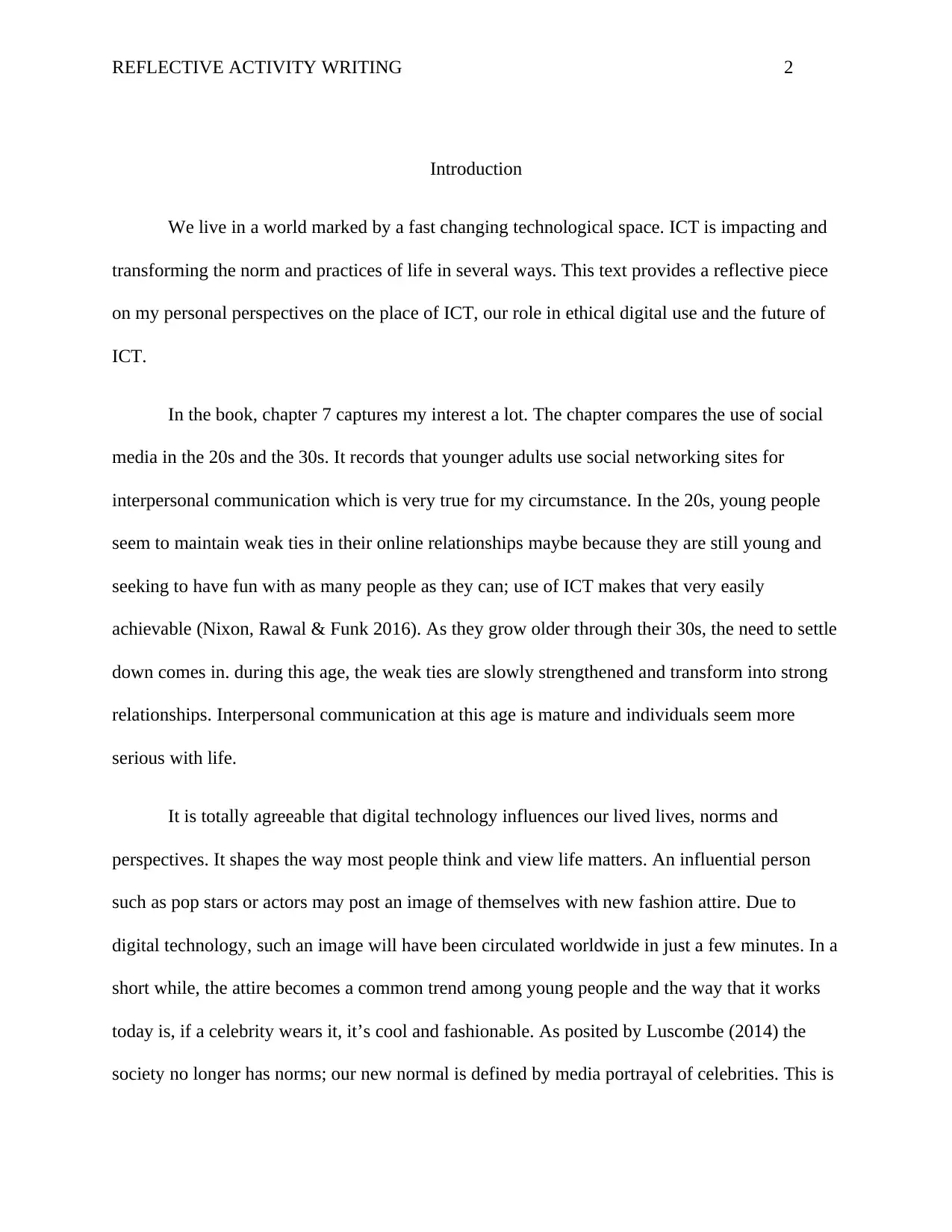
REFLECTIVE ACTIVITY WRITING 2
Introduction
We live in a world marked by a fast changing technological space. ICT is impacting and
transforming the norm and practices of life in several ways. This text provides a reflective piece
on my personal perspectives on the place of ICT, our role in ethical digital use and the future of
ICT.
In the book, chapter 7 captures my interest a lot. The chapter compares the use of social
media in the 20s and the 30s. It records that younger adults use social networking sites for
interpersonal communication which is very true for my circumstance. In the 20s, young people
seem to maintain weak ties in their online relationships maybe because they are still young and
seeking to have fun with as many people as they can; use of ICT makes that very easily
achievable (Nixon, Rawal & Funk 2016). As they grow older through their 30s, the need to settle
down comes in. during this age, the weak ties are slowly strengthened and transform into strong
relationships. Interpersonal communication at this age is mature and individuals seem more
serious with life.
It is totally agreeable that digital technology influences our lived lives, norms and
perspectives. It shapes the way most people think and view life matters. An influential person
such as pop stars or actors may post an image of themselves with new fashion attire. Due to
digital technology, such an image will have been circulated worldwide in just a few minutes. In a
short while, the attire becomes a common trend among young people and the way that it works
today is, if a celebrity wears it, it’s cool and fashionable. As posited by Luscombe (2014) the
society no longer has norms; our new normal is defined by media portrayal of celebrities. This is
Introduction
We live in a world marked by a fast changing technological space. ICT is impacting and
transforming the norm and practices of life in several ways. This text provides a reflective piece
on my personal perspectives on the place of ICT, our role in ethical digital use and the future of
ICT.
In the book, chapter 7 captures my interest a lot. The chapter compares the use of social
media in the 20s and the 30s. It records that younger adults use social networking sites for
interpersonal communication which is very true for my circumstance. In the 20s, young people
seem to maintain weak ties in their online relationships maybe because they are still young and
seeking to have fun with as many people as they can; use of ICT makes that very easily
achievable (Nixon, Rawal & Funk 2016). As they grow older through their 30s, the need to settle
down comes in. during this age, the weak ties are slowly strengthened and transform into strong
relationships. Interpersonal communication at this age is mature and individuals seem more
serious with life.
It is totally agreeable that digital technology influences our lived lives, norms and
perspectives. It shapes the way most people think and view life matters. An influential person
such as pop stars or actors may post an image of themselves with new fashion attire. Due to
digital technology, such an image will have been circulated worldwide in just a few minutes. In a
short while, the attire becomes a common trend among young people and the way that it works
today is, if a celebrity wears it, it’s cool and fashionable. As posited by Luscombe (2014) the
society no longer has norms; our new normal is defined by media portrayal of celebrities. This is
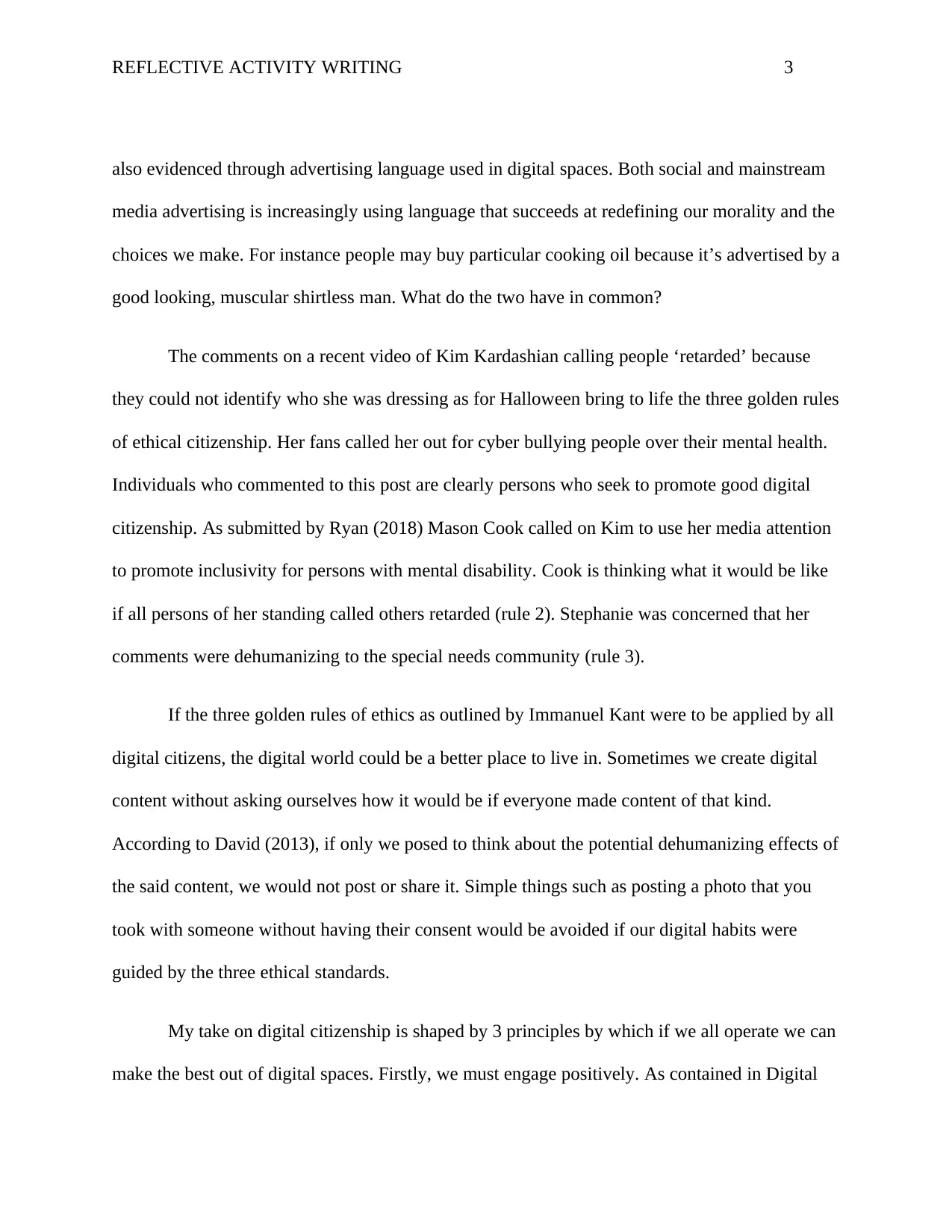
REFLECTIVE ACTIVITY WRITING 3
also evidenced through advertising language used in digital spaces. Both social and mainstream
media advertising is increasingly using language that succeeds at redefining our morality and the
choices we make. For instance people may buy particular cooking oil because it’s advertised by a
good looking, muscular shirtless man. What do the two have in common?
The comments on a recent video of Kim Kardashian calling people ‘retarded’ because
they could not identify who she was dressing as for Halloween bring to life the three golden rules
of ethical citizenship. Her fans called her out for cyber bullying people over their mental health.
Individuals who commented to this post are clearly persons who seek to promote good digital
citizenship. As submitted by Ryan (2018) Mason Cook called on Kim to use her media attention
to promote inclusivity for persons with mental disability. Cook is thinking what it would be like
if all persons of her standing called others retarded (rule 2). Stephanie was concerned that her
comments were dehumanizing to the special needs community (rule 3).
If the three golden rules of ethics as outlined by Immanuel Kant were to be applied by all
digital citizens, the digital world could be a better place to live in. Sometimes we create digital
content without asking ourselves how it would be if everyone made content of that kind.
According to David (2013), if only we posed to think about the potential dehumanizing effects of
the said content, we would not post or share it. Simple things such as posting a photo that you
took with someone without having their consent would be avoided if our digital habits were
guided by the three ethical standards.
My take on digital citizenship is shaped by 3 principles by which if we all operate we can
make the best out of digital spaces. Firstly, we must engage positively. As contained in Digital
also evidenced through advertising language used in digital spaces. Both social and mainstream
media advertising is increasingly using language that succeeds at redefining our morality and the
choices we make. For instance people may buy particular cooking oil because it’s advertised by a
good looking, muscular shirtless man. What do the two have in common?
The comments on a recent video of Kim Kardashian calling people ‘retarded’ because
they could not identify who she was dressing as for Halloween bring to life the three golden rules
of ethical citizenship. Her fans called her out for cyber bullying people over their mental health.
Individuals who commented to this post are clearly persons who seek to promote good digital
citizenship. As submitted by Ryan (2018) Mason Cook called on Kim to use her media attention
to promote inclusivity for persons with mental disability. Cook is thinking what it would be like
if all persons of her standing called others retarded (rule 2). Stephanie was concerned that her
comments were dehumanizing to the special needs community (rule 3).
If the three golden rules of ethics as outlined by Immanuel Kant were to be applied by all
digital citizens, the digital world could be a better place to live in. Sometimes we create digital
content without asking ourselves how it would be if everyone made content of that kind.
According to David (2013), if only we posed to think about the potential dehumanizing effects of
the said content, we would not post or share it. Simple things such as posting a photo that you
took with someone without having their consent would be avoided if our digital habits were
guided by the three ethical standards.
My take on digital citizenship is shaped by 3 principles by which if we all operate we can
make the best out of digital spaces. Firstly, we must engage positively. As contained in Digital
⊘ This is a preview!⊘
Do you want full access?
Subscribe today to unlock all pages.

Trusted by 1+ million students worldwide
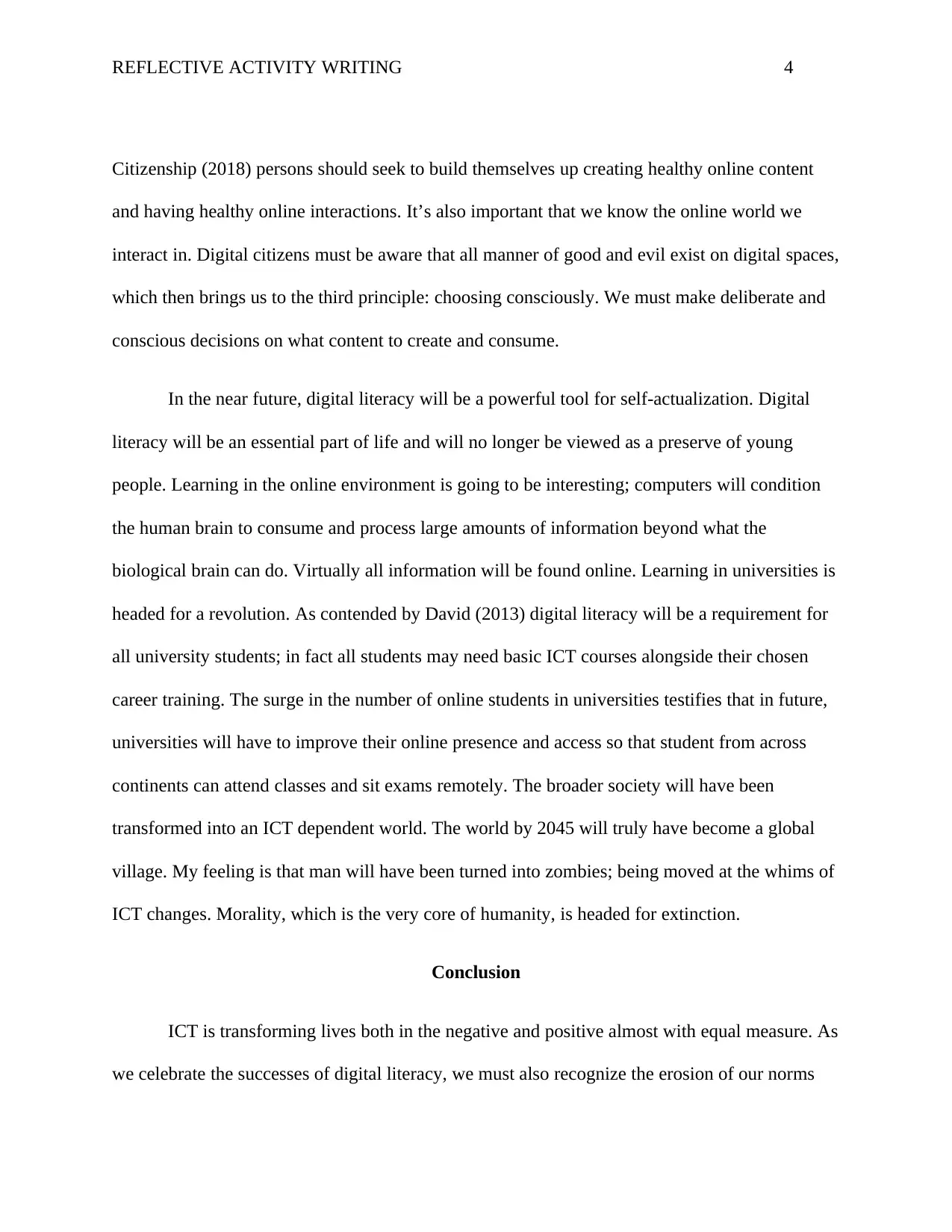
REFLECTIVE ACTIVITY WRITING 4
Citizenship (2018) persons should seek to build themselves up creating healthy online content
and having healthy online interactions. It’s also important that we know the online world we
interact in. Digital citizens must be aware that all manner of good and evil exist on digital spaces,
which then brings us to the third principle: choosing consciously. We must make deliberate and
conscious decisions on what content to create and consume.
In the near future, digital literacy will be a powerful tool for self-actualization. Digital
literacy will be an essential part of life and will no longer be viewed as a preserve of young
people. Learning in the online environment is going to be interesting; computers will condition
the human brain to consume and process large amounts of information beyond what the
biological brain can do. Virtually all information will be found online. Learning in universities is
headed for a revolution. As contended by David (2013) digital literacy will be a requirement for
all university students; in fact all students may need basic ICT courses alongside their chosen
career training. The surge in the number of online students in universities testifies that in future,
universities will have to improve their online presence and access so that student from across
continents can attend classes and sit exams remotely. The broader society will have been
transformed into an ICT dependent world. The world by 2045 will truly have become a global
village. My feeling is that man will have been turned into zombies; being moved at the whims of
ICT changes. Morality, which is the very core of humanity, is headed for extinction.
Conclusion
ICT is transforming lives both in the negative and positive almost with equal measure. As
we celebrate the successes of digital literacy, we must also recognize the erosion of our norms
Citizenship (2018) persons should seek to build themselves up creating healthy online content
and having healthy online interactions. It’s also important that we know the online world we
interact in. Digital citizens must be aware that all manner of good and evil exist on digital spaces,
which then brings us to the third principle: choosing consciously. We must make deliberate and
conscious decisions on what content to create and consume.
In the near future, digital literacy will be a powerful tool for self-actualization. Digital
literacy will be an essential part of life and will no longer be viewed as a preserve of young
people. Learning in the online environment is going to be interesting; computers will condition
the human brain to consume and process large amounts of information beyond what the
biological brain can do. Virtually all information will be found online. Learning in universities is
headed for a revolution. As contended by David (2013) digital literacy will be a requirement for
all university students; in fact all students may need basic ICT courses alongside their chosen
career training. The surge in the number of online students in universities testifies that in future,
universities will have to improve their online presence and access so that student from across
continents can attend classes and sit exams remotely. The broader society will have been
transformed into an ICT dependent world. The world by 2045 will truly have become a global
village. My feeling is that man will have been turned into zombies; being moved at the whims of
ICT changes. Morality, which is the very core of humanity, is headed for extinction.
Conclusion
ICT is transforming lives both in the negative and positive almost with equal measure. As
we celebrate the successes of digital literacy, we must also recognize the erosion of our norms
Paraphrase This Document
Need a fresh take? Get an instant paraphrase of this document with our AI Paraphraser
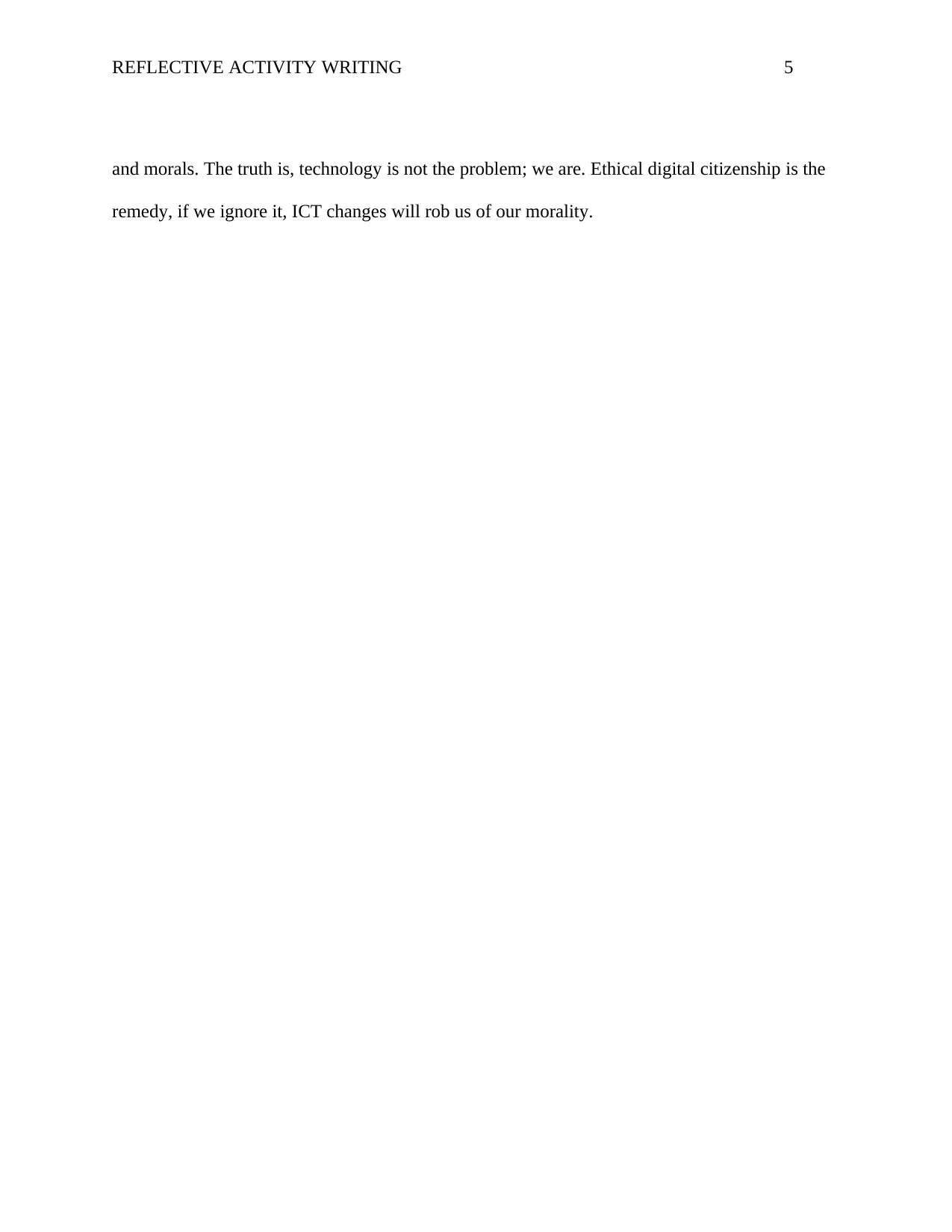
REFLECTIVE ACTIVITY WRITING 5
and morals. The truth is, technology is not the problem; we are. Ethical digital citizenship is the
remedy, if we ignore it, ICT changes will rob us of our morality.
and morals. The truth is, technology is not the problem; we are. Ethical digital citizenship is the
remedy, if we ignore it, ICT changes will rob us of our morality.
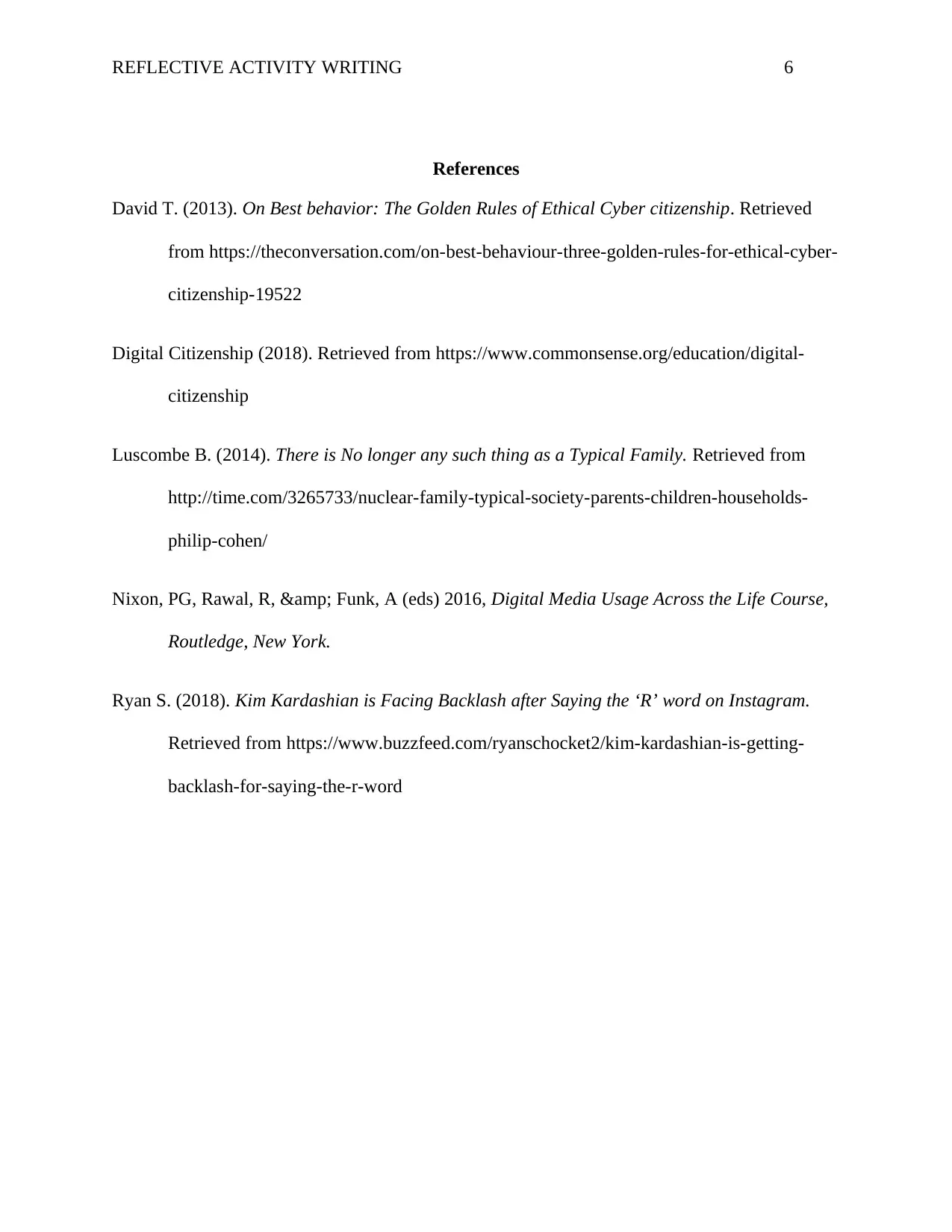
REFLECTIVE ACTIVITY WRITING 6
References
David T. (2013). On Best behavior: The Golden Rules of Ethical Cyber citizenship. Retrieved
from https://theconversation.com/on-best-behaviour-three-golden-rules-for-ethical-cyber-
citizenship-19522
Digital Citizenship (2018). Retrieved from https://www.commonsense.org/education/digital-
citizenship
Luscombe B. (2014). There is No longer any such thing as a Typical Family. Retrieved from
http://time.com/3265733/nuclear-family-typical-society-parents-children-households-
philip-cohen/
Nixon, PG, Rawal, R, & Funk, A (eds) 2016, Digital Media Usage Across the Life Course,
Routledge, New York.
Ryan S. (2018). Kim Kardashian is Facing Backlash after Saying the ‘R’ word on Instagram.
Retrieved from https://www.buzzfeed.com/ryanschocket2/kim-kardashian-is-getting-
backlash-for-saying-the-r-word
References
David T. (2013). On Best behavior: The Golden Rules of Ethical Cyber citizenship. Retrieved
from https://theconversation.com/on-best-behaviour-three-golden-rules-for-ethical-cyber-
citizenship-19522
Digital Citizenship (2018). Retrieved from https://www.commonsense.org/education/digital-
citizenship
Luscombe B. (2014). There is No longer any such thing as a Typical Family. Retrieved from
http://time.com/3265733/nuclear-family-typical-society-parents-children-households-
philip-cohen/
Nixon, PG, Rawal, R, & Funk, A (eds) 2016, Digital Media Usage Across the Life Course,
Routledge, New York.
Ryan S. (2018). Kim Kardashian is Facing Backlash after Saying the ‘R’ word on Instagram.
Retrieved from https://www.buzzfeed.com/ryanschocket2/kim-kardashian-is-getting-
backlash-for-saying-the-r-word
⊘ This is a preview!⊘
Do you want full access?
Subscribe today to unlock all pages.

Trusted by 1+ million students worldwide
1 out of 6
Your All-in-One AI-Powered Toolkit for Academic Success.
+13062052269
info@desklib.com
Available 24*7 on WhatsApp / Email
![[object Object]](/_next/static/media/star-bottom.7253800d.svg)
Unlock your academic potential
Copyright © 2020–2026 A2Z Services. All Rights Reserved. Developed and managed by ZUCOL.